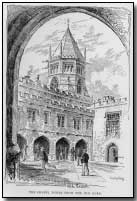Feature Articles - The Most Popular War in History - Public School Organisation

A Brief Word on Public School Organisation
Public schools, as understood by the 1890's and 1900's, were fee-paying, single-sex (usually male), all boarding and of Christian foundation (as the 19th Century wore on the Chapel, and the Headmaster's religious outlook, would become increasingly important).
The term 'public' has nothing to do with access: rather, it refers to the fact that pupils were educated in the company of large numbers of others living communally away from home. Hence 'public', i.e. living in public- few lifestyles could be more public than sharing a large room with 15 or 20 or more other boys!
In addition, there were the team games and communal life generally which made it impossible to escape other people, and which led to the development of a highly distinctive corporate identity. It was these factors which distinguished 'public' school education from private.
Much of the teaching curriculum was taken up with the Classics (ancient Greek and Latin languages, literature and history) although other subjects were beginning to acquire some status - for instance natural science at Clifton College.
Time outside school hours was taken up with team (and other) games, almost always compulsory. Administration was usually vested in a Board of Governors who appointed the Head Master. This arrangement sometimes resulted in friction between the professional Head in charge of the day-to-day running of the place, and the Governors who would often be local worthies and others from outside the education world.
They took pupils from the age of thirteen to eighteen and could comprise several hundred boys. By way of breaking down this formidable mass the boys were organised into 'Houses' of between 40 and 60. Houses were often actual buildings as well as administrative units, and formed the boarders' immediate and often Spartan environment. Boys slept there, and also ate their meals and had morning and evening prayers there.
A boy's Housemaster was therefore usually a far more important adult than the Head Master, although the 'Arnold tradition' of delegation to the Sixth Form meant that senior boys (prefects) were more important figures still in a boy's life. Housemasters had considerable latitude in how they ran their houses, and were a frequent stumbling-block to a reforming Head. Competitive sport within the School was organised on a House basis, which meant that a boy's first focus of loyalty was almost always the House.
For a brief discussion of the homosexuality issue (often raised), click here.
Bibliography:
1. Honey, J R de S (1977) Tom Brown's Universe: the development of the Public School in the 19th Century Millington Books Ltd., 109 Southampton Row, London WC1B 4HH
2. Gathorne-Hardy J (1977) The Public School Phenomenon, Hodder and Stoughton, London
Picture Credit:
Drawing of Rugby School quadrangle taken from Great Public Schools p142
Click here to view the main article
Article and photographs contributed by Humphrey Reader.
A 'Wibble-Wobble' was slang for tanks.
- Did you know?
